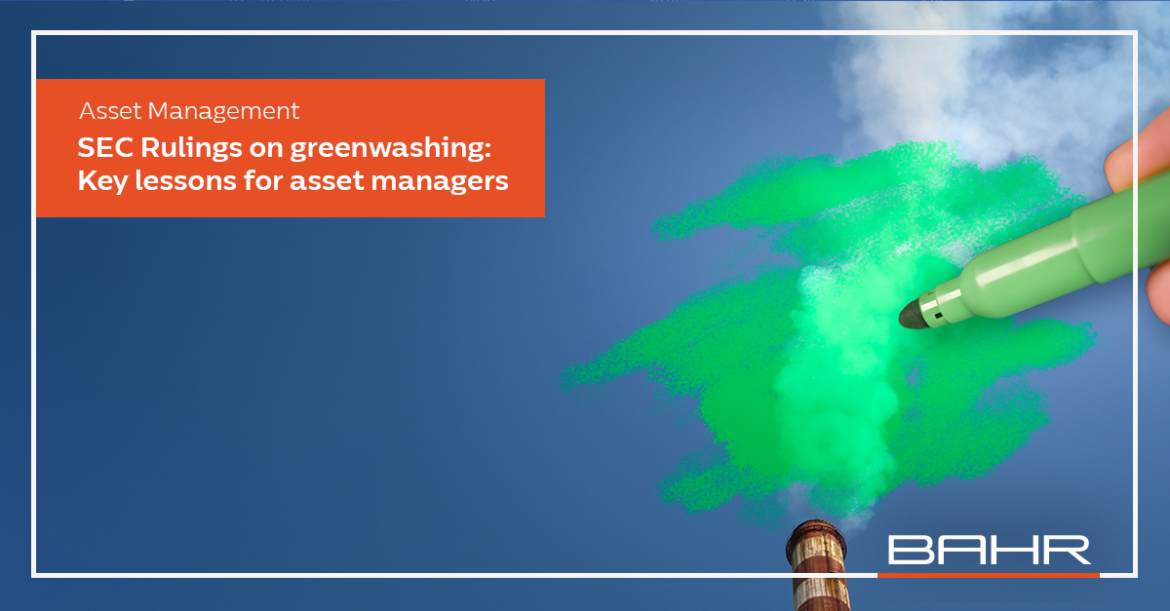Asset Management | SEC Rulings on greenwashing: Key lessons for asset managers

Case summaries
The SEC recently handed down two rulings concerning two US regulated entities’ misrepresentation of ESG practices.
Between 2020 and 2022, Invesco Advisers, Inc. (Invesco) made misleading statements about the percentage of its assets under management (AUM) that were “ESG integrated.”
An internal analysis revealed that Invesco risked losing $370 billion in AUM to competitors, prompting accelerated ESG efforts. However, the percentages of AUM claimed to be ESG integrated (70% to 94%) was overstated, largely due to the inclusion of passive ETFs that could not consider ESG factors because they followed non-ESG indices. The claims were made in presentations to fund boards, proposals to prospective clients, and marketing materials. Invesco also lacked written policies and procedures to determine the percentage of firmwide AUM that was ESG integrated, leading to inconsistent and overstated figures.
The SEC found that Invesco violated several sections of the US Advisers Act with respect to fraudulent, untrue, and misleading statements and imposed a civil money penalty of $17.5 million.
WisdomTree Asset Management, Inc. (WisdomTree) misstated to its board and investors that certain ESG funds would not invest in companies involved in controversial activities such as fossil fuels and tobacco. In reality, the funds invested in companies involved in coal mining, natural gas extraction, and tobacco retail due to incomplete data from a third-party vendor. Despite being aware of the data limitations, WisdomTree failed to inform the board and to revise the prospectuses in a timely manner. WisdomTree also failed to adopt and implement written policies and procedures to prevent violations of the Advisers Act in connection with the investment process for the ESG funds.
The SEC found that WisdomTree willfully violated several sections of the US Advisers Act and the Investment Company Act and imposed a civil money penalty of $4 million.
Lessons learned and key takeaways
Although these cases involve two US-regulated entities, the rules and regulations applied share many similarities with those in the EU/EEA, offering several relevant takeaways for EU/EEA asset managers.
Sanjay Wadhwa, Acting Director of the SEC’s Division of Enforcement, emphasized the following in the press releases for the charges against Invesco and WisdomTree:
- “Companies should be straightforward with their clients and investors rather than seeking to capitalize on investing trends and buzzwords.”[1]
- “At a fundamental level, the federal securities laws enforce a straightforward proposition: investment advisers must do what they say and say what they do.” [2]
These cases underscore the importance for asset managers to ensure that their ESG claims and disclosures are accurate and verifiable. The Invesco case demonstrates how even vague and seemingly non-ambitious terms like “ESG integration”, can result in liability. Such terms are frequently used in offering documents and marketing materials for EU/EEA funds.
The WisdomTree case further illustrates that exclusion criteria, which may appear straightforward to apply and adhere to, can be complex to implement effectively. A manager breaching its own exclusion list constitutes a breach of fund mandates and is a serious transgression for an asset manager. As evidenced by the WisdomTree case, creating an exclusion list demands thorough consideration of the criteria and a well-structured investment process to accurately screen and evaluate potential investments against these criteria.
In addition to the general lessons above, asset managers should take note of the following takeaways:
- Adhere to the SEC Director’s advice: The principle of “doing what you say and saying what you do” is fundamental for regulatory compliance and maintaining investor trust.
- Verify ESG claims: Ensure all ESG claims are accurate, credible, and supported by verifiable data, avoiding vague and empty phrases.
- Ensure oversight of outsourced services: Maintain oversight of all outsourced services, including data purchased, as outsourcing does not absolve asset managers of responsibility.
- Develop clear policies: Establish and maintain written policies and procedures tailored to the manager’s ESG practices to ensure compliance.
- Regular reviews: Regularly update ESG disclosures and policies to reflect regulatory changes and the ESG practices applied by the manager.
- Maintain transparency: Clearly communicate ESG methodologies and criteria to investors and supervisors, especially in areas of regulatory uncertainty, and assess the need to notify relevant stakeholders when learning of limitations and shortcomings in ESG practices.
BAHR Comments
While Norway has regulations to sanction misleading ESG claims, its supervisory authorities have not yet been as active in this area as their US counterparts. However, the potential for similar regulatory actions exists, and Norwegian asset managers should learn from the Invesco and WisdomTree cases. The SEC Director’s principle ‘do what they say and say what they do’ should be considered as a license to operate for asset managers. As fiduciaries, asset managers must earn and maintain the trust of their investors by complying with all agreed terms.
As the scrutiny of ESG claims by investors, supervisory authorities, and other stakeholders is intensifying, it is imperative to address and correct any potential misrepresentations promptly. We advise all asset managers to thoroughly review their claims and statements regarding ESG factors, both for funds under management and firm wide. If external communication suggests that ESG considerations are being given more significance in the investment activities than is actually the case, managers should take action to avoid potential investor disputes, legal liability, regulatory actions, and loss of reputation and trust.
[1] SEC.gov | SEC Charges Invesco Advisers for Making Misleading Statements About Supposed Investment Considerations
[2] SEC.gov | SEC Charges Advisory Firm WisdomTree with Failing to Adhere to Its Own Investment Criteria For ESG-Marketed Funds
